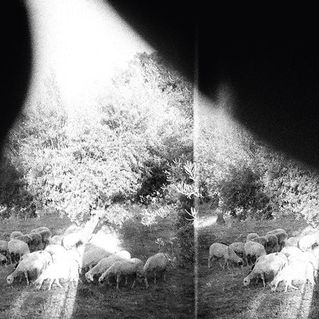Godspeed You! Black Emperor turns in brisk look at apocalypse

April 8, 2015
Godspeed You! Black Emperor
Asunder, Sweet and Other Distress
Grade: B
Critics often throw around the term “atmospheric” when discussing post-rock acts of the last decade. I hesitate to describe genre pioneer Godspeed You! Black Emperor with a single word, but something like stratospheric might be a more appropriate choice.
When the Canadian instrumental band reunited in 2012, ending an album-less decade with Allelujah! Don’t Bend! Ascend!, they reified themselves as one of our most vital post-rock acts. Allelujah! incorporated Middle Eastern instrumentation and motifs into an already complex style of composition, creating new avenues for expression within the genre. For anyone questioning Godspeed’s ability to create beautiful syntheses of instrumentation, Allelujah! disproved the naysayers.
Three years after its fourth studio album, the enigmatic group of musicians continued its consistent discography with Asunder, Sweet and Other Distress. Unlike some of their previous releases, like 2000’s Lift Your Skinny Fists Like Antennas to Heaven, which clocks in at nearly 90 minutes, Asunder is a brisk four-song effort. The two bookending tracks, both longer than 10 minutes, frantically crash and modulate through ideas. When compared to the band’s usual 20-minute arrangements, the album feels more like an EP.
But that’s not to say that Asunder feels rushed. The songs progress slowly, layering each instrumental introduction before beckoning more to join the foray of sound. Asunder effaces its four tracks into an uninterrupted whole. Instead of falling into their renowned compositional style (swelling crescendos that create suspense, followed by cathartic release), the band dives right into the heart of its abrasive sonic palette on the album’s first track, “Peasantry or ‘Light! Inside of Light!’”
The minimal opening drum kit punctuates the silence with a metallic quality. Heavily distorted power chords dominate the space, evoking a dualistic sense of dread and awe-inspiring power. The bass hums with menace in the background while a sole violin wails, eerily crying for solace that may never come. The band answers the tension with a beautiful violin arpeggio, asserting itself above the cacophonous storm. The violins embellish and lighten earlier motifs, ascending above their own decrepit circumstance.
Like many of Godspeed’s other albums, notably Lift Your Skinny Fists and Yanqui U.X.O., Asunder offers a balance of downtrodden, desolate soundscapes and uplifting ones. But Godspeed mostly favors the former over the latter on Asunder.
The nine-minute “Lambs’ Breath” is an often arduous ambient drone track that manages to derail the momentum from “Peasantry.” The guitars reach new peaks of distortion here, taking notes from the wailing guitars heard on Allelujah, but with an emphasis on sounding grotesque and guttural. Although the timbre on “Lambs’ Breath” and the opening of “Asunder, Sweet” is complex and detailed, the instrumentals lend themselves to passive listening, and it recedes into the background.
The album redeems itself in its second half, due to the emotionally-charged buildup of “Asunder, Sweet” leading to the album’s pinnacle, “Piss Crowns Are Trebled.” Dormant violins burn brightly as walls of distorted noise resurface. The drums make a triumphant return as well, evolving the soundscape from ambient drone into a slow, methodical march. The mood is melancholy, as if mourning the loss of humanity.
Then the pace changes, becoming more urgent and deliberate. The drumming beckons for attention, beating your ears senseless while the violin ensemble and guitars work harmoniously to renounce their own existence and welcome the impending apocalypse. The sonic wave grows to a colossal scale of discord and dissonance, asking the listener to atone for the troubles of mankind before destroying everything in its path. As the violin ensemble scales higher in tone, the mood becomes more hopeless.
Just as you give in to the imminent doom, the punctuation of the drums recedes. All that remains are the song’s remnants, washing calmly across a desolate landscape. The violins wail, but their echoes enunciate a strange sense of hope.
Godspeed’s albums have always examined the impending apocalypse in all its terror and beauty. If nothing else, Asunder gives us the feeling of powerlessness and asks us to accept our purpose in that helplessness. It’s a helplessness that turns our perception into one of appreciation and wonder.


